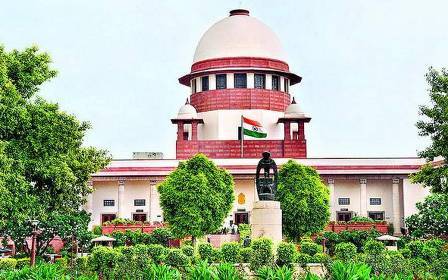Chief Secretary and Deputy Director of Director Public Instruction (College) Office ordered to appear through video conferencing on March 5.
EDITOR-IN-CHIEF VINAY KOCHHAR.CHANDIGARH.

The Supreme Court has severely reprimanded the Punjab government for repeatedly delaying the implementation of the three decade old pension scheme and reneging on the assurances given to the court. The court has ordered the Chief Secretary of Punjab and Deputy Director of Director Public Instruction (College) Office to appear through video conferencing on March 5.
A bench of Justices Abhay S Oka and Ujjwal Bhuiyan said – The Punjab government assured the High Court more than twice to implement the scheme, but despite this a lot of time was wasted.
This matter is related to the petition filed by Rajneesh Kumar and other petitioners seeking implementation of Punjab Privately Managed Affiliated and Punjab Government Aided College Pensionary Benefits Scheme, 1996. The scheme was issued on December 18, 1996, but has not been implemented till date. Senior advocates PS Patwalia, Puneet Jindal and Gaurav Agarwal appeared for the petitioners.
False assurances given several times in court
The court said that on July 26, 2001, the Punjab government had assured the High Court that the scheme would be finalised in three months, but when the Principal Secretary of the Higher Education Department appeared in the court on May 2, 2002, he expressed regret for not following the order properly.
The court then acquitted the government of the charge of contempt, provided that the scheme is published and implemented by June 15, 2002. But the state government did not fulfill this promise either and introduced a new scheme (Punjab Privately Managed Recognised Affiliated Aided Colleges Pension and Contributory Provident Fund Rules, 2002) on July 9, 2002, which led to a new controversy.
Repeated assurances given to the High Court
On 29 July 2011, 30 September 2011, 4 November 2011 and 2 December 2011, the government repeatedly assured the High Court that the 2002 rules would be withdrawn, but this process was completed on 12 January 2012. Despite this, instead of implementing the 1996 scheme, the government brought a bill on 18 December 2012 and repealed it with effect from 1 April 1992.
The Supreme Court expressed displeasure over the false claims of the government
The court rejected the arguments of the Punjab government and said that the government can no longer argue that the promise given in the High Court was made only by the executive and not by the state government. The court warned – If the government continues to adopt such tactics, the courts will stop accepting the statements of government lawyers and it will become mandatory to take an affidavit on every statement.
Apart from this, the government recently claimed in an affidavit that no option was adopted under the 1996 scheme, which the court termed as a “completely false statement”. The court said that if the scheme was not implemented till June 15, 2002, then the question of filling the option does not arise.
Action can be taken against officials
The court strongly condemned this attitude of the government and said that the state government is repeatedly going back on the assurances given to the court and filing false affidavits. The Supreme Court warned that if the situation is not clarified, legal action will be taken against the officer who filed the affidavit. Now the Chief Secretary and Deputy Director of the Punjab Government will have to appear in the Supreme Court on March 5 through video conferencing.

